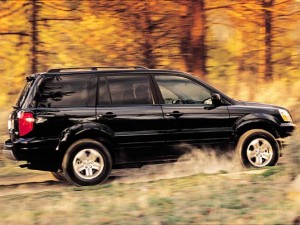
NHTSA will consider a request to open a formal investigation targeting more than 1.5 million older Ford Escape SUVs.
Federal safety investigators are taking a closer look at reported safety problems that could eventually involve more than 2 million Ford and Honda vehicles – though it is far from certain the moves will result in eventual safety-related recalls.
A formal probe is now underway by the National Highway Traffic Safety Administration targeting Honda Odyssey minivans and Pilot SUVs because of concerns about defective ignition locks that could permit vehicles to roll away.
NHTSA is, meanwhile, reviewing a request to open a formal investigation into reports that the last-generation Ford Escape suffers from a defect that could cause engine stalls or surges.
The issues could prove problematic for the two makers if they eventually lead to recalls.
Honda has been suffering an increased series of safety-related problems – including two recalls this week alone that impacted nearly 1.5 million vehicles. The maker is already on track to repeat its dubious distinction as the manufacturer suffering from the most vehicles recalled in 2011.
Ford, meanwhile, has been the target of a number of recent safety actions related to the Escape utility vehicle, both prior-generation models and the all-new 2013 version. That not only could impact consumer perception of the popular brand but come as a setback for Ford which is trying to recover from several years of quality problems.
In the case of Honda, a formal NHTSA investigation is now underway into the possibility that key locks on the Odyssey and Pilot models might be defective. Normally, keys can only be removed from the ignition when the vehicles are firmly in Park, but NHTSA is looking at reports shift interlock mechanisms are failing, allowing the keys to be removed when the vehicle is not in Park. That could permit them to roll away unexpectedly.
The government has received 43 complaints and word of 16 crashes. In two cases, people were injured trying to stop the vehicles, one suffering a broken leg, the other an injured knee.
The investigation is focused on Honda Odyssey and Pilot models equipped with automatic transmissions produced during the 2003 and 2004 model-years.
Ford Escape SUVs produced between 2005 and 2012 are the target of a separate issue. NHTSA is looking into a complaint by the North Carolina Consumers Council alleging the vehicle’s electronic throttle body can fail. That could alternately lead to an engine stall or an engine surge.
The consumer group point to “a number of technical service bulletins” Ford has released relating to throttle body issues. Makers will sometimes advise dealer service departments about problems that don’t cross the legal threshold requiring a full-fledged recall.
But if NHTSA does agree to begin a full, formal investigation, a recall could eventually follow.
Current-generation 2013 Escapes, as well as older models, already have been subject to four recalls over the last three months.

